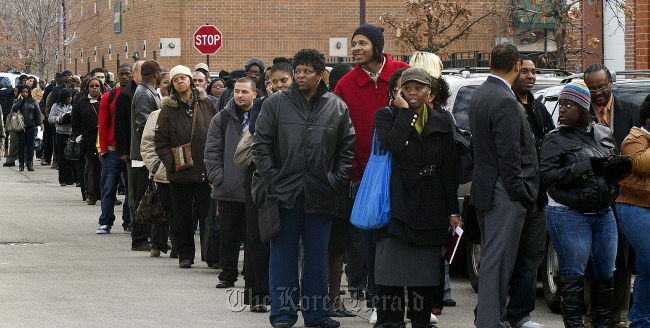 |
Job seekers stand in line to enter the City of Chicago job fair at Kennedy King College in Chicago, Illinois. (Bloomberg) |
WASHINGTON (AP) ― Who’ll be the first to feel the sting?
Jobless Americans who have been out of work for a long time and local governments that are paying off loans to fix roads and schools are in tough spots when it comes to the automatic federal budget cuts that are scheduled to kick in Friday.
About 2 million long-term unemployed people could see checks now averaging $300 a week reduced by about $30. There could also be reductions in federal payments that subsidize clean energy, school construction and state and local public works projects. Low-income Americans seeking heating assistance or housing or other aid might encounter longer waits.
Government employees could get furlough notices as early as next week, though cuts in their work hours won’t occur until April.
The timing of the “sequester” spending cuts has real consequences for Americans, but it also has a political ramifications. How quickly and fiercely the public feels the cuts could determine whether President Barack Obama and lawmakers seek to replace them with a different deficit reduction plan.
Eager to put pressure on Republican lawmakers to accept his blend of targeted cuts and tax increases Obama has been highlighting the impact of the automatic cuts in grim terms. He did it again on Monday, declaring the threat of the cuts is already harming the national economy.
Republicans say he is exaggerating and point to rates of spending, even after the cuts, that would be higher than in 2008 when adjusted for inflation. All Obama has to do to avoid the damage, House Speaker John Boehner said at the Capitol, is agree to the GOP’s recommended spending cuts ― with no tax increases.
By all accounts, most of the pain of the $85 billion in spending reductions to this year’s federal budget would be slow in coming. The dire consequences that Obama officials say Americans will encounter ― from airport delays and weakened borders to reduced parks programs and shuttered meatpacking plants ― would unfold over time as furloughs kick in and agencies begin to adjust to their spending reductions.
“These impacts will not all be felt on day one,” Obama acknowledged in a meeting with governors at the White House on Monday. “But rest assured the uncertainty is already having an effect.”
Homeland Security Secretary Janet Napolitano warned that the federal government would be unable to “maintain the same level of security at all places around the country” once the automatic cuts began to take effect.
The public will feel the results “in the next few weeks,” she said, and “it will keep growing.”
The majority of the federal budget is in fact walled off from the cuts. Social Security and veterans’ programs are exempt, and cuts to Medicare are generally limited to a 2 percent, $10 billion reduction in payments to hospitals and doctors. Most programs that help the poor, like Medicaid, food stamps, subsidized school lunches, Pell Grants and supplemental security income payments are also exempt.
Still, the Pentagon will feel the brunt of half the cuts. Pay for active military is off-limits for cuts, so the rest of the defense budget must absorb the hit. The Obama administration says defense contractors have already ramped down work, contributing to a dip in economic activity in the fourth quarter of last year. The Navy has decided not to deploy an aircraft carrier as planned to the Persian Gulf.
Elsewhere, the White House’s budget office says long-term unemployed Americans would lose an average of more than $400 in benefits over the year. The cuts do not affect state unemployment benefits, which jobless workers typically get soon after their loss of work. The federal reductions could begin immediately, though some analysts say the government could delay them for a short period to avoid a harmful hit on the economy.








![[Weekender] Korea's traditional sauce culture gains global recognition](http://res.heraldm.com/phpwas/restmb_idxmake.php?idx=644&simg=/content/image/2024/11/21/20241121050153_0.jpg)